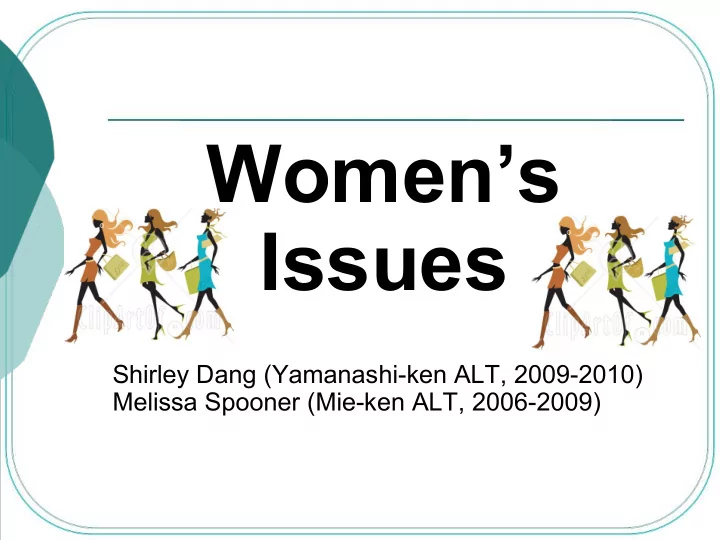

Women’s Issues Shirley Dang (Yamanashi-ken ALT, 2009-2010) Melissa Spooner (Mie-ken ALT, 2006-2009)
Overview of Session ● Clothing/Hair ● Healthcare needs ● Cultural differences/expectations * ESID: Everyone’s Situation Is Different (uber-JET word)
Sizing : few clothing sizes are available in sizes larger than a U.S. size 6-8; Uniqlo offers larger sizes ■ Bras – bring from home or order online (smaller sizes are generally padded); this includes sports bras ■ Shoes – generally the largest size shoe sold (LL) is equivalent to women’s size 8; you may also want to bring socks if your shoe size tends to be bigger *You can also be creative! One woman’s mini-dress can be another (taller) woman’s blouse…
Part 2 Workwear : no sleeveless shirts/dresses, don’t show cleavage, no see through clothing, no shorts, no super bold accessories; might want to wear pantyhose with skirts/dresses *Our advice – see what your other co-workers wear, some schools are less formal than others Outside of work : up to you, you have more freedom but you may run into your students
Skin Care/Toiletries : many women find that skin issues appear upon arrival to Japan; some items may be different or not work as well for some people (toothpaste/deodorant) - experiment with different brands or bring products from home Make-up : a lot of choices - though foundation may be limited due to skin tone; choose from shiseido, kose, kao, etc. They are readily available almost everywhere! Whitening products : many skin care and make-up selections have whitening agents - labeled as ' 美白' (bihaku) or ホワイトニ ング(whitening) A trip to the Hot Springs (onsen) is an essential Japanese experience!
Hair products : Japan is VERY humid, so that may mean using hair products that you have never considering using before; lots of cute accessories that you can indulge in Haircuts/Coloring : ask fellow JETs what salons are recommended; keep in mind that some salons may not be used to varied hair textures (Melissa's unfortunate mullet cut); coloring products tend to be a lot stronger, so use with caution
National health insurance : insurance generally covers 70% of doctor visits and other health related costs ■ a good English speaking doctor resource is: http://japanhealthinfo. com/ School check-ups : required annual health check generally includes height/weight, blood/urine checks, and chest X-ray *If you have any personal OTC medicine favorites, consider bringing them with you to Japan - just make sure if they are legal
Contraceptives : be aware that contraceptive options may be more limited in Japan ■ Birth control ( 経口避妊薬) - most people bring their own oral contraceptives, but be aware of customs regulations; in Japan commonly referred to as the "piru" ( ピル) ■ Emergency contraceptive ( 緊急避妊法) - may want to bring a dosage of Plan B with you, as some clinics may not offer emergency contraceptives ○ Guide to finding clinics that offer emergency contraceptives: www.survivingnjapan.com /2012/05/how-to-find-clinic-or-hospital-that.html ■ Condoms - size selection is not as extensive
Part 2 Gynecologist : the best way to find an English speaking doctor is to ask fellow JETs or local Japanese friends; utilize Japan Healthcare Info (http://japanhealthinfo.com/) ■ keep in mind that many gynecologists in Japan are male, so you may also have to hunt for a female doctor ■ the procedure may a bit different and often includes a "privacy curtain" Feminine Products : there are a variety of sizes and shapes to sanitary napkins (just have to find the right description!); tampons are less prominent, but available by the company "Charm" at most drug stores
Celebrity status : people in the community will want to know what you do in your free time, what kinds of things you buy, where you hang out, who you were seen with, etc. Stereotypes : people may have expectations of you (e.g., all Americans have blonde hair and blue eyes); be understanding and be willing to gently explain differences Personal Boundaries : may be a bit more relaxed than you're used to in some ways (e.g., female students poking breasts; questions regarding marriage, children, age)
Traveling in Japan : Japan is generally a very safe country for female travelers (Melissa traveled alone to many hostels throughout Japan) ■ be smart and follow general safety guidelines (don't go into that dark alley) ■ you will attract a certain amount of attention simply because you look different, but in most cases it is harmless curiosity Harassment : harassment can occur anywhere, including at school from students and teachers - just be firm and show your disapproval ■ "chikan" - a very harsh way of saying "pervert" and is usually used by women on trains who have been grabbed; not a word to be used lightly
Write down your prescriptions and if possible get a doctor's note on why you may need certain medications; be aware of customs regulations and if your medicines are legal to take into the country. Stock up on OTC favorites and give your mailing address to your loved ones so that they can send you things. If you can, bring some DVDs/music/books from home to keep you company during your first month! (Most people won't have internet for 3-4 weeks). Go to the dentist and doctor to make sure you are healthy and ready to go!
Feel free to email us! Shirley Dang - shirleydang@gmail.com Melissa Spooner - spooner.mm@gmail.com Have a terrific time on JET – it’s great to be female in Japan!
Recommend
More recommend